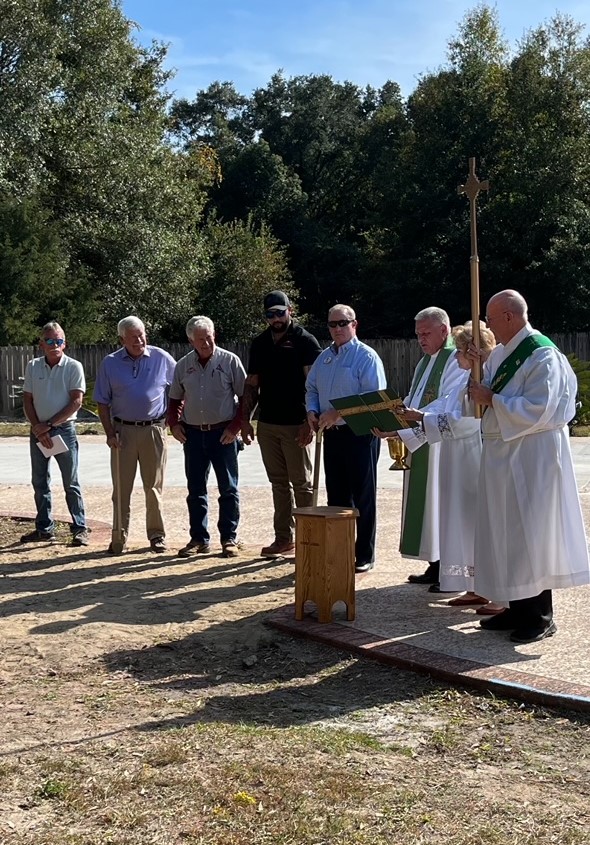WILL YOUR CHURCH BE NEXT?
There are three things that I would like to say as follow up to my last two articles about two ELCA congregations where their respective synods used paragraph S13.24 in the ELCA’s constitution for synods as justification and empowerment to take over and close a CORE-friendly congregation and to claim to have the right to the property of a former-ALC congregation that had taken its first vote to disaffiliate from the ELCA.
The first one is this: It could happen to anyone. S13.24 empowers a synod council to “take charge and control of the property of a congregation” if “the membership of a congregation has become so scattered or so diminished in numbers that it cannot provide required governance or . . . fulfill the purposes for which it was organized” and if the synod council determines that it needs to take this action “to protect and preserve the congregation’s property from waste and deterioration.” Since telling the story of two congregations – one in the Metropolitan Chicago Synod and one in the Southwest California Synod – I have been informed of situations in other synods where the synod council has taken similar action against congregations. And in none of those situations has the membership of that congregation become “so scattered or so diminished” or has the property of that congregation become in danger of “waste and deterioration.” Rather in each situation either the synod did not like the direction of the ministry of the congregation (it did not line up with the ELCA) or the synod wanted to grab the assets of the congregation before that congregation were to leave the ELCA. In one situation the synod council took this action against a congregation even though the synod committee that was charged with reviewing the situation did not find sufficient reason for the synod council to do so.
It is important that people know what this kind of total takeover entails. In one situation the synod closed the congregation. In another situation the synod demanded that the congregation turn over the deed to the property. In a third situation the synod appointed a group of trustees to have full and complete authority in regard to the assets and business affairs of the congregation. In other words, the congregation’s elected leadership is completely disempowered.
It is my opinion that we are going to see an increasing number of examples of synod councils’ using (mis-using) S13.24 to close, take over, and/or seize the properties of congregations. As synods continue to experience a decrease in their number of congregations and a decrease in the financial viability of congregations, they will experience a decrease in income from congregations. And with the severe shortage of pastors, synods will not be able to provide all congregations with a pastor. So what will they do? I believe they will take over and close congregations, get the number of congregations down to the number of available pastors, sell buildings and properties, and thereby accumulate financial assets that will enable them to continue to advance their radical, leftist agenda for years to come.
Because synods are taking this kind of action against congregations whose membership is not scattered or diminished, and whose property is not in danger of “waste and deterioration,” this kind of takeover could happen to anyone. Will your congregation be next?
The second thing I want to say is this. I continue to be absolutely astounded at how quickly the ELCA is departing from Biblical moral values, confessional Lutheran theology, and a Biblical concept of the mission of the church. Once the dam broke, it did not take long for anything holding back the floodwaters to be completely washed away.
In my Summer Letter from the Director I wrote about St. Timothy Lutheran Church in the Hermosa neighborhood of northwest Chicago. This was the location for Lutheran CORE’s annual Encuentro festival for bi-lingual and Spanish language ministries. The bishop of the Metropolitan Chicago Synod threatened the supply preacher (who also was the coordinator of the Encuentros) with discipline and possible removal from the ELCA clergy roster if he did not immediately cease his ministry there. And the sons of the former pastor who were maintaining the property and providing stability and leadership to the congregation were evicted from the parsonage (and have since then moved out of the area).
Within a few short days after the removal of confessional Lutheran leaders, what is happening at that congregation now? Under the guidance and with the permission of the two Latinx pastors who were appointed by the synodical bishop, a neighborhood group that makes use of a South American psychoactive and entheogenic brewed drink called Ayahuasca is holding weekend-long gatherings in the church building. In case you are not familiar with it, Ayahuasca is used both socially and as a ceremonial or shamanic spiritual medicine among the indigenous peoples of the Amazon basin. Its use has recently spread to North America and Europe. This drink creates altered states of consciousness and psychedelic experiences which can include visual hallucinations and altered perceptions of reality. Before the weekend-long event a shaman blesses the space, which once had been the location of a Christo-centric Lutheran ministry.
How could one possibly justify the holding of this kind of alternate spiritual experience on the property of a Lutheran congregation? According to one of the Latinx pastors who was appointed by the synod to lead and serve the congregation, the people of South America who make use of Ayahuasca were oppressed by the Conquistadores and their religions and culture were marginalized if not destroyed. Therefore, we must be hospitable to them today. Certainly we need to be welcoming and hospitable to all people. But I cannot imagine the Old Testament prophets saying to the Canaanite people, “We have oppressed you ever since we moved into this land. We have marginalized if not destroyed your religions and culture. Therefore, we will invite you to set up an altar in the Temple.” What that synod-appointed Latinx pastor is doing sounds consistent with the “Declaration of Inter-Religious Commitment,” which was overwhelmingly approved by the 2019 ELCA Churchwide Assembly. After declaring that “we must be careful about claiming to know God’s judgments regarding another religion,” that document then states that our main role as Christians is to love and serve our neighbor. In other words, as followers of Christ we have nothing unique to offer. And if we have nothing unique to offer, why not invite a shaman to bless the space, which once had been the location of a Christo-centric Lutheran ministry, and why not offer Ayahuasca-induced altered states of consciousness, psychedelic experiences, and visual hallucinations, instead of introducing people to Jesus, who is the Way, the Truth, and the Life and who came that we might have life and have it abundantly?
The third thing I want to say is this. As expected, the ELCA has absolutely no interest in hearing any voice other than its own.
As I wrote in my Summer Letter from the Director, I was very pleased to hear back – and in a very timely way – from Judith Roberts, senior director for ELCA Diversity, Equity, and Inclusion, and co-convenor of a task force for addressing the disciplinary concerns of leaders of color. I told her about the situation with the bishop of the Metropolitan Chicago Synod and St. Timothy, and how in this situation a leader of color was the perpetrator rather than the victim of harassment and discrimination. She wrote back –
“Thank you for sharing your concerns, and we will certainly take them into account. The Churchwide Organization takes misconduct complaints against synod bishops seriously; if you believe that a synod bishop has engaged in misconduct, please direct that concern to the Presiding Bishop.”
I waited until after the three sons of the former pastor who had been maintaining the property and providing leadership and stability for the congregation were safely out of the parsonage. Then I sent an account of the events at St. Timothy to five ELCA leaders – Presiding Bishop Elizabeth Eaton; Imran Siddiqui, vice president of the ELCA; Tracie Bartholomew, chairperson of the Conference of Bishops; and the two members of the task force that made the presentation to the Conference of Bishops – Judith Roberts and Bishop Paul Erickson of the Greater Milwaukee Synod. I never heard from any of them.
* * * * * *
VIDEO MINISTRIES
HERE is a link to our You Tube channel. In the top row you will find both our Video Book Reviews as well as our CORE Convictions Videos on various topics related to Biblical teaching, Lutheran theology, and Christian living. You will find these videos in the order in which they were posted, beginning with the most recent. In the second row you will find links to the Playlists for both sets of videos. This month we want to feature two videos.
WHO GETS TO EAT? ISSUES OF ADMISSION TO THE LORD’S SUPPER
BY ERIC W. GRITSCH
REVIEWED BY FR LAWRENCE (LARRY) RECLA
Many thanks to Fr Lawrence (Larry) Recla STS for his review of the book, “Who Gets to Eat?” by Eric W. Gritsch. Pastor Recla is a retired ELCA clergy now serving an Episcopal Church. He is also Dean of the Florida Chapter of The Society of the Holy Trinity. HERE is a link to his video review.
Pastor Recla writes, In the 1970’s several seminarians at Gettysburg Seminary wanted to have their children receive Communion. The Reverend Dr. Eric W. Gritsch became the center of what some would call a controversy. “Who Gets to Eat?” is my editing nine lectures and printed essays from the late 1970’s as well as other original materials into a format more suitable for reading in a book. Dr. Gritsch invites us to a reasoned debate with the presentation of the various historical positions the Church has practiced and espoused. He has the integrity to include all positions, not just those supporting his conclusions. While I am at some divergence with some of his conclusions, I am convinced that everyone, clergy and laity, would be informed and humbled by attending to his presentation. Some might even be convinced to the contrary of their initial inclinations; all would be the more respectful of others’ conclusions.
REFRESHMENT AND DELIVERANCE: THE MUSIC OF FAITH
BY WILLIAM DECKER
Many thanks to William Decker, retired ELCA deacon (and formerly an associate in ministry), for reminding us of how music will always play an integral part in human life, and this includes the music of faith. HERE is a link to his video, which underscores the amazing role that music has played in Christian congregations.
The author introduces the video with some pivotal theological insights from Martin Luther. In his own writings, Luther spoke the words of a true musician, giving to music his “highest praise” next to theology’s fundamental truths about the Christian life. The video ends by emphasizing the place that Christian hope embodies in each of us as we sing the Lord’s song.
In between these theological pillars, the author then looks at a variety of practical ways that our congregations have sought to worship God through music: that is, through the choir, summer worship, the organ, instrumentalists, and traditional hymns. His video is based on a little more than six decades of congregational experience.
Bill Decker recently retired as the musician at Messiah Lutheran Church in Park Ridge, IL after more than four years. He has sung in children’s and adult choirs and his college’s Chapel Choir. He plays the piano, writes a bit of music, and is a novice at the organ.
* * * * * *
May the Lord bless you, keep you, make His face shine upon you, be gracious to you, look upon you with favor, and give you peace.
Dennis D. Nelson
Executive Director of Lutheran CORE











